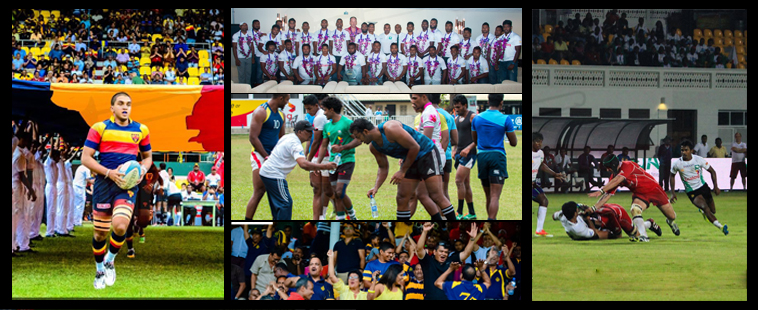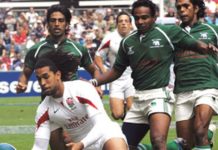Sri Lanka Rugby on the back of their win over the Philippines has now the option of challenging the 3rd seed finisher of the Asian Rugby top three championship. The question is; are the Tuskers ready to earn that spot and if so can they compete in the top 3? The simple answer is no…
Qualifying and competing in the Elite Championship should be Sri Lanka’s target for the future. Sri Lanka at present is not equipped to take on whoever the number 3 seed is of the Elite championship. The top three consists of Japan, Hong Kong and Korea all three of whom have been exceedingly dominant over Sri Lanka in the last decade. There are numerous facets both on and off the field that Sri Lanka needs to develop in order to contend with Asia’s elite.
Administrators need to come up with a structured system for a National programme. This has to be a long term program designed to be most effective over the course of the next five to ten years. Sri Lanka rugby is currently in a vital transition period between semi-professional and professional rugby and if it is not done right Sri Lanka rugby will suffer for years to come.
This national programme has to include a few key features in order to be effective. Firstly it needs a squad of professional players along with a professional coach. These players also need vigorous physical conditioning and frequent match practice. In addition to this Rugby must be developed around the country both within and independent of Rugby playing schools. Lastly plans must be put in place to involve more fans and supporters in the sport both at club level as well as international level.
Professionalized squad
This programme must include a system for an annually selected squad of no less than 40-45 players, with preparations for them to meet and train together on a regular basis. This does not mean these players need to sacrifice time from their club teams. The squad can meet just once or twice a month whilst the club season is in progress just for a tactical session where they can just walk through tactics, lineout ploys and back-line moves in-order to stay connected as a team. This team must include both senior players as well as up and coming youngsters. It must be a squad that is focussed on building a brighter future for Sri Lanka rugby. The senior players in the squad have to take it upon themselves to help the youngster grow as rugby players which means players egos cannot play apart in the squad. Every member of the squad must work towards making Sri Lanka Rugby better rather than make a name for himself. This will help the players to gel as a unit, which will in turn translate to on-field cohesiveness.
Professional Coach
In addition to regular training; a permanent coach, independent of club rugby must be appointed. Sri Lanka has struggled to consistently hold-down a full time national coach whose sole objective all year around is to develop a national rugby program. A coach needs time to analyze his players and evaluate his options and combinations just throwing a squad together two weeks ahead of a tournament is never going to provide consistent results. The coach must be tasked with scouting and recruiting his staff including a strength and conditioning coach along with any other assistant coaches he feels will be required.
Strength and Conditioning
Along with regular training sessions, these players must be required to undergo regular fitness and strength testing in order to ensure that players are always in top physical condition. Players must be tested at minimum once a month and have to maintain their physicality. These tests must include medical checkups along with injury management. As rugby players’ injuries are unavoidable but if players are taught how manage their injuries, time spent on the sidelines decline drastically. This will also help lengthen individual careers. Players also have to be assessed individually and provided with a diet and supplementation based on physical needs.
More test Rugby
The national programme must also include methods for the Sri Lanka squad to have additional match practice. For starters they must play more international rugby. Sri Lanka is currently ranked 38th in the IRB ratings, having climbed 9 positions on the back of their most recent win. In order to improve as a team Sri Lanka must play between 5 and 10 tests a year against teams between the ranking of 30 and 45. Unfortunately in some cases the IRB rankings are not the most accurate evaluation of a national side as inter-regional play amongst teams outside the top 20 is very rare. Therefore opponents must be evaluated on a case by case basis. The Tuskers can also look for games against second string Japanese, Hong Kong and Korean teams as well as club or provincial sides from the bigger rugby countries like New Zealand, South Africa, Australia, France and England.
Grassroots Program
The SLRFU must create awareness for rugby in provinces outside of the Central and Western regions which are the only areas feeding rugby as of now. Coaching clinics and development programs have to be implemented all around the country along with an advancement system where talent can be identified and nurtured early. This grass-roots system must also include a plan for junior national teams at all age groups. Getting these youngsters together at a young age will allow them to learn what is required of national players. If Sri Lanka can start them competing internationally at a young age, by the time players reach their prime they will be ready for test rugby. The Under 20 teams over the past few years have barely had any structure and have simply gone through the motions. The under 20 team is the breeding ground for Sri Lanka rugby and must be developed into a dependable unit.
Improving Schools rugby
The SLRFU must also be more involved in current schools tournaments. There must be an organized structure implemented where talent from all over Sri Lanka is garnered and eventually transitioned into professional rugby. As Sri Lanka clubs do not have academies that develop talent, the schools are burdened with shaping Sri Lanka Rugby’s future. Unfortunately Sri Lanka schools do not produce good enough quality that can be drafted onto the national stage. School rugby receives more prominence and funding than any other level of rugby in the country. It draws the largest crowds behind international cricket in Sri Lanka. Unfortunately all this exposure has not transpired into growth. Schools rugby is flooded with talented players but the majority of these players are not nurtured and developed into professional athletes. The ages between 14 and 20 are perhaps the most crucial years in a professional rugby player’s career. It is at this age that raw talent is transformed into professionalism. Sadly schools coaches have rather narrow-minded systems in place and are not equipped to develop these players. Coaches are only interested in having a good season in that year and have no interest or care for the future of their players. Every coach from under 12 to under 20 should have a primary goal to nourish Sri Lanka’s talent, it should be a collective national cause.
More from the fans
However, strangely the biggest drawback in Sri Lanka’s rugby fraternity is that playing for your school always seems to be a more valued achievement than representing Sri Lanka. It is sad that youngsters dream of wearing their schools stripes all through their school career but very few ever dream of the Tuskers whites. Playing for Sri Lanka seems to be an afterthought to having represented your school. The attitude is mostly ‘if it happens great, if not at least I have my schools colours.’ It is pitiful to think that a schools game can sell out a stadium whilst the National team can barely fill the stands. Fans dole out thousands of rupees a year to watch school games but it unlikely to consider paying to watch Sri Lanka playing.
This by no means is a call to shy away from schools rugby, but a call to flock towards international Rugby. If supporters can display half the passion and enthusiasm directed at their school to national Rugby, the Tuskers will be well on their way. There have been many occasions where rugby supporters will only attend a Sri Lanka game if the side consists of players from their Alma-mater. Whatever happened to National pride? The brutal truth is that the more interest fans show in the National team the more the team will grow. Regrettably this works in reverse as well as; the better Sri Lanka performs the more following it gathers, which makes it a rather awkward cycle to get out of.
All in all the Tuskers may have a long way to go in-order to get to where they need to be, but the platform of talent exists within the country. Sri Lanka is ripe with prospects and if they are given a nudge in the right direction Sri Lanka Rugby will have a bright future.
















